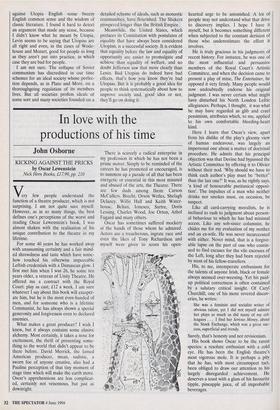In love with the productions of his time
John Osborne
KICKING AGAINST THE PRICKS by Oscar Lewenstein Nick Hem Books, £17.99, pp. 210 Very few people understand the function of a theatre producer, which is not surprising. I am not quite sure myself. However, as in so many things, the best defines one's perceptions of the worst and reading Oscar Lewenstein's book, I was almost shaken with the realisation of his unique contribution to the theatre in my lifetime.
For some 40 years he has worked away with unassuming certainty and a fair mind- ed shrewdness and taste which have some- how touched his otherwise impeccable Leftish credentials with a Damascan glow. I first met him when I was 26, he some ten years older, a veteran of Unity Theatre. He offered me a contract with the Royal Court: play as cast; f12 a week. I am sure whatever I say about this book will exasper- ate him, but he is the most even-handed of men, and for someone who is a lifetime Communist, he has always shown a special generosity and forgiveness even to declared enemies.
What makes a great producer? I wish I knew, but it always contains some elusive alchemy. Most certainly, it takes a nose for excitement, the thrill of presenting some- thing to the world that didn't appear to be there before. David Merrick, the famed American producer, mean, sadistic, a sworn foe of anyone creative, also had a Pauline perception of that tiny moment of stage time which will make the earth move. Oscar's apprehensions are less complicat- ed, certainly not venomous, but just as downright. There is scarcely a radical enterprise in my profession in which he has not been a prime mover. Simply to be reminded of the careers he has promoted or encouraged, is to summon up a parade of all that has been energetic or essential in this most misused and abused of the arts, the Theatre. There are few duds among Them: Carson McCullers, Brecht, Orson Welles, Shelagh Delaney, Willis Hall and Keith Water- house, Behan, Ionesco, Sartre, Doris Lessing, Charles Wood, Joe Orton, Athol Fugard and many others.
Oscar has sometimes suffered mockery at the hands of those whom he admired. Actors are a treacherous, ingrate race and even the likes of Tony Richardson and myself were given to scorn his open- hearted urge to be astonished. A lot of people may not understand what that drive to discovery implies. I hope I have it myself, but it becomes something different when subjected to the constant derision of those who underestimate the effort it involves.
He is truly gracious in his judgments of recent history. For instance, he was one of the most influential and persuasive members of the Royal Court's Artistic Committee, and when the decision came to present a play of mine, The Entertainer, he opposed it very firmly. Many people would now undoubtedly endorse his original judgment. I was never certain what might have disturbed his North London Leftie allegiances. Perhaps, I thought, it was what he may have regarded as glib and cruel pessimism, attributes which, to me, applied to his own comfortable bleeding-heart kind.
Here I learn that Oscar's view, apart from his dislike of the play's gloomy view of human endeavour, was largely an impersonal one about a matter of doctrinal procedure. He admits that his principal objection was that Devine had bypassed the Artistic Committee by offering it to Olivier without their nod. 'Why should we have to think each author's play must be "better" than the last one?' It was, as he rightly says, `a kind of honourable puritanical opposi- tion'. The impulses of a man who neither drinks nor smokes must, on occasion, be suspect.
Like all card-carrying moralists, he is inclined to rush to judgment about person- al behaviour to which he has had minimal access. Like any sob-sister columnist, he chides me for my evaluation of my mother and an ex-wife. He was never incarcerated with either. Never mind, that is a forgive- able lapse on the part of one who contin- ued to find excuses for the vile excesses of the Left, long after they had been rejected by most of his fellow-travellers.
His, to me, intemperate enthusiasm for the talents of anyone Irish, black or female always seemed over-weening. Yet his paid- up political correctness is often contained by a salutary critical insight. Of Caryl Churchill, one of his more revered discov- eries, he writes:
She was a feminist and socialist writer of obvious talent, yet I did not myself admire her plays as much as did many of my col- leagues .. . I find her Serious Money, about the Stock Exchange, which was a great suc- cess, superficial and trendy.
Surely, that's honesty and not revisionism.
His book shows Oscar to be the rarest species: a resolute enthusiast with a cold eye. He has been the English theatre's most vigorous mole. It is perhaps a pity that he has, with most circumspect tact, been obliged to draw our attention to his largely disregarded achievement. He deserves a toast with a glass of his favourite tipple, pineapple juice, of all improbable beverages.


























































 Previous page
Previous page